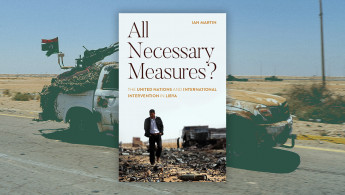All Necessary Measures? The United Nations and International Intervention in Libya
Few things have plagued western policymakers more this century than the tricky dilemmas in deciding when and when not to intervene militarily in a crisis, and then how to manage the aftermath.
The Iraq war of 2003 is the most notorious case because of the toxic atmosphere in the run-up to the war and the abject handling of the Anglo-American occupation that followed. Every intervention since has occurred in the shadow of that disaster, even in Ukraine.
"The line between protecting civilians and pursuing regime change [in Libya] was blurred, to put it mildly"
NATO’s Libyan intervention in 2011 is one that requires more attention.
Ian Martin, the UN’s former representative in Libya does just that by carefully assessing all the challenges the international community faced in dealing with the Gaddafi regime, the uprising against his rule and in the aftermath.
He was in the perfect position to make an assessment as the man who had to oversee the setting up from scratch of the UN operation in Libya in 2011.
The Libya case is perhaps not so clear cut as Iraq, and as the author argues, “no purported parallel could be less apt.”
The rationale for intervention was perhaps a little clearer and initially many saw it as successful. NATO suffered zero casualties. The US under Obama was a far different creature from the gung-ho Bush was over Iraq.
Gaddafi was threatening civilians “to purify Libya inch by inch.” Yet as many argue was the original mandate from the UN Security Council breached? Was there mission creep?
Could other diplomatic initiatives have worked out not least the African Union one that major NATO powers ignored? Martin has argued that “the African Union was treated, very, very badly. The wounds of that are still quite apparent today.”
Having outlined all the differing arguments for the intervention Martin concludes that there was a failure of accountability, both in terms of the formal NATO operations and even more in terms of the secret special forces operations and the supply of arms.
He focuses on the role of the so-called Four Amigos – France, the UK, Qatar and the UAE in actions that went beyond the UN Security Council mandate.
Where was the oversight? He is rightly critical of the failure to assess the number of Libyan civilian fatalities in a mission designed to protect them.
The line between protecting civilians and pursuing regime change was blurred, to put it mildly, as emphasised by the UK Prime Minister’s response to the fall of Tripoli that he had ‘just won a war.'
"Gaddafi had also spent decades sowing regional and tribal divisions across Libya as part of his divide and rule policy. Institutions barely existed"
Moving to the transition, Martin makes a key point that many members of the international community were fearful of getting too involved. Libya had resources, both financial as a result of oil but also human.
The NTC had many qualified professionals. Western states were concerned that if they got too involved, the cries of western interference would be deafening. After Iraq in 2003, many were anxious to ensure that it was a Libyan-owned process.
Unlike other crises, regional and neighbouring actors did not appear to pose a threat to the transition. Nevertheless, an argument for a peacekeeping or stabilisation mission can be made particularly in a situation where institutions barely existed and armed militias predominated.
Yet any such mission would have been swiftly opposed in Libya.
|
The rush to elections in July 2012 may now be seen as hasty. Yet as Martin points out it was the Libyan parties themselves who were determined to press forward with this.
And it is a tough proposition to persuade Libyans to accept an interim authority with no electoral legitimacy, after decades of having no say in who rules over them.
Yet the challenges of the interim period were also underestimated. This was due in large part to the ‘extremely limited understanding of Libya among decision-makers.’
Gaddafi had also spent decades sowing regional and tribal divisions across Libya as part of his divide and rule policy. Institutions barely existed.
Martin correctly identifies the issues of armed groups as the challenge that proved to be the “most fatal in the planning,” one that bedevils Libya even today.
Martin noted that the UN had no means to understand how these armed groups were developing.
The likes of the NTC boasted they would be able to take control of these militias but sadly it never was able to do so.
The value of this work is that it explains all the intricate challenges of working in a post-dictatorial conflict zone. It shows contrary to tabloid-style journalism that few decisions were easy or obvious, a warning to sofa critics who have never had to face such tasks.
Whilst it was not the aim of the book, it is also a telling reminder of all those like Ian Martin who do work in institutions in the UN who have dedicated their lives to improving the world and the extraordinary value of such public service.
Chris Doyle is the director of CAABU (Council for Arab-British Understanding). He is a regular opinion writer and commentator on the Middle East and has organised and accompanied numerous British parliamentary delegations to the region.
Follow him on Twitter: @Doylech

![Protesters clash with policemen near the US embassy in Manila as the protesters attempt to march in front of the embassy to denounce NATO's military intervention in Libya [Getty Images]](/sites/default/files/styles/medium_16_9/public/2022-06/GettyImages-110470887.jpg?h=69f2b9d0&itok=dltcP1Ps)


